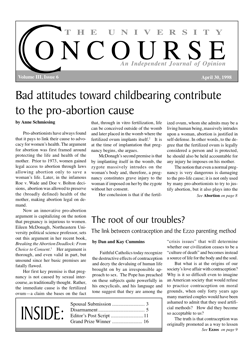A point of principle
by Kathleen van Schaijik
The editors have heard that some readers are objecting to our occasional practice of printing anonymous articles. The essence of their complaint seems to be this: “Anonymous opinions have no place in Christian discourse. If someone is afraid to put his name to a piece, he has no business publishing it. It does nothing but spread tension and ill will.” This is a plausible and by no means uncommon view, but I don’t think it’s just.
First, if there is tension, I think it is generated more by the theory that anonymous opinions are unchristian than by the reality of the few anonymous things we’ve printed, which are in themselves remarkably inoffensive. And secondly, the theory itself is not just. There are any number of reasons for not wanting to put our name to an article, which have nothing to do with cowardice.
For instance, suppose Father Michael had been reading the Concourse and thought he had an important point to make in one of our discussions. He thought that the point would help advance the debate a good way, but he didn’t want to throw the weight of his office behind it; he wanted the readers to be free to consider it on its own merits, without being unduly influenced by the respect they have for him or his position at the University. To me, that would be a very good reason for printing his contribution anonymously. I can think of dozens of others.
Recall the opening lines of C.S. Lewis’ The Problem of Pain: “When [my publisher] suggested to me the writing of this book, I asked leave to be allowed to write it anonymously, since, if I were to say what I really thought about pain, I should be forced to make statements of such apparent fortitude that they would become ridiculous if anyone knew who made them. Anonymity was rejected as inconsistent with the series”. (Note that it was rejected as inconsistent with the series, not as inconsistent with the principles of Christian discourse.) Lewis recognized that there are times when the identity of the writer works as a distraction or a stumbling block to the reception of the truth the article is trying to convey. There are other times when a highly-charged political atmosphere makes it too costly for a person to be candid, though what he has to say may be vitally important for the good of the whole community. At those times, to insist on signatures would be to turn away numberless valuable contributions to important discussions, and thus let politics triumph over truth.
In such cases, and many others, a truth-centered editor, would be falling down on the job, so to say, if she categorically refused to publish articles anonymously.
Finally, I point out that there is a long-standing tradition of anonymity in Christian controversy. (I’d have to look it up to be exact, but I remember having learned that, in fact, there was a time when virtually no Christian writers put their names to their work, because to do so was considered egotistical—what mattered was the truth content or the persuasive power of the article itself, not the identity of the author.)
The famous Oxford Movement “Tracts for the Times,” which were so toweringly influential in their day, were published anonymously, as were Newman’s withering “Tamworth Reading Room” letters, in which he publicly excoriated Sir Robert Peel for his religious liberalism. Many of Kierkegaard’s books, too, were published under a pseudonym. Surely we wouldn’t want to accuse these Christian controversialists of anything like cowardice?
All that being said, I acknowledge freely that anonymity can be problematic, which is why we are careful about what we publish anonymously and why. Our official policy states: “We will consider printing submissions anonymously, or under a pen-name, however, in general we wish to encourage open ‘face to face’ discussion.”
Our aim in every case is to serve truth.


